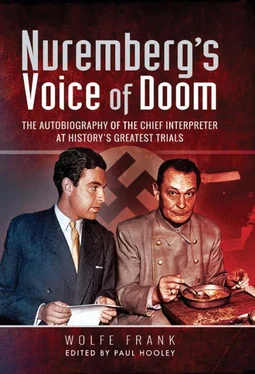When Pat was in a show I saw a lot of the actor Ferdy Mayne, [4] Born Ferdinand Philip Mayer-Hocrckel in Mainz in 1916, Ferdy Mayne appeared in over 230 films and countless West End productions.
and his several girl friends. In fact, his charmingly dynamic activities in that area earned him the nickname of ‘The West End Stallion’ and I have sworn statements that he deserved it. My nickname was ‘Big Bad Wolf’.

16. GATHERING STORM CLOUDS
TIME WAS MOVING FAST, as it always does when life is full of joy and worry free. Then, in the autumn of 1938, came the Czechoslovakian crisis [1] The German occupation of Czechoslovakia began in 1938 with the invasion of the Sudetenland, the former German-Austria border regions.
and my first performance as a simultaneous interpreter – I translated one of Hitler’s maddest radio speeches for a group of friends. We dispersed, shattered, to burn the candle at both ends before disaster struck.
In February 1939, I made one last pre-war skiing trip to Davos [2] Davos, an Alpine town in Switzerland, was Wolfe Frank’s favourite place. He loved skiing and visited Davos often over much of his lifetime. He eventually had homes there and hoped that would be where his ashes would be scattered.
and, on the last day, I skied the whole of the ten miles downhill from the mountain’s top to the station to catch the train back to England. It was a glorious winter morning and fresh snow had fallen during the night.
The world was white and blue and golden. I stopped in the sun for a while and, leaning on my poles, I let my eyes wander over the endless ranges of the Alps.
Not fifty miles away was the German border. As I stood there, breathing it all in, I had a strong premonition that I would not see this beautiful picture again for a long time. It seemed unbelievable to me that men behind that border were planning war and destruction. There are moments in life one will always remember very clearly – that was one of them for me.
I thought long and seriously about freedom and decency and how fortunate I had been. I pictured England at war and thought of the friends I had left behind in Germany, who were now in German uniforms, and I sought to visualize the long, long road to victory. I thought about myself and I knew that I wanted to be in that war and yet had no idea how it would be done. To the British authorities I was a former German. What would I be allowed to do in this war to come? Would I be interned? Surely, with my political past and my father’s citizenship, which would have to be unearthed, this could be avoided.
During the train journey back to England I made plans to get into the British Army there and then. On my return I began to pull strings. The answer was utterly discouraging in every instance. It ranged from the reply that, ‘I was being silly since there would be no war’, to the statement that, ‘once a German always a German and I had no business trying to get into the British Army’. There were 40,000 similarly placed Austrians and Germans in England at that time, all of who shared my status.
Towards the middle of August 1939, I walked into the War Office and began asking where an alien could enlist in the British Forces. After wandering around the building for some time I reached a backroom where an official produced a form that, he thought, might apply to a case like mine. I filled in the form. It was the only form I have ever completed in England that didn’t, at some time or another, catch up with me again. It probably ended up in the wastepaper basket.
I called on the officer in Scotland Yard who knew me as the, ‘Hitler-abusing friend of Humphrey Sykes’. I wanted to know if I would be interned. No, he thought, certainly not. ‘Scotland Yard,’ he explained, ‘had all enemy aliens well taped’. There were no arrangements to intern anybody if war were to break out, and more useful information could be gathered by watching us whilst we were free – and anyway Scotland Yard had my dossier and I would be the last to be affected even if internment were to come.
A few days after war was declared on 3 September 1939, the orders affecting ‘enemy aliens’ were published. All would have to go before Aliens Tribunals [3] Aliens Tribunals were set up in September 1939 to make certain that no one who ought to be interned remained free. They also dealt with the proper disposal of all aliens whose activities, status, general character and disposition towards this country were investigated.
who would base their decisions on the police file, a personal statement and a testimony by sponsors who had to be British.
There were three categories of Enemy Alien – A, B and C.
Category A meant immediate internment.
Category B placed restrictions on movements and required regular reporting to the police.
Category C (friendly enemy alien) meant no restrictions except notification of address.
In October 1939 I went before such a tribunal and was classified as being Category ‘C’. I continued running the two companies for Sykes but the job in Florida was now out of reach, as I could no longer leave England.
A friend of mine from Munich, Wolfgang Schlittgen, was far less lucky than I, and his story is so weird that it must be told. I had known Wolfgang in Munich for years. His appearance indicated that he was Jewish, but he was pure Aryan. One day, in 1935, he and a friend had taken their girlfriends to lunch in a restaurant near Munich. There was a table with SA men – storm-troopers – who kept glancing in their direction. When the group left the restaurant the SA men had beaten the hell out of Wolfgang, in order to, ‘teach him, the bloody Jew, to lay off running around with German girls’.
Wolfgang decided something had to be done. He had heard of a Nazi organization which could be joined and would issue a membership card, to be shown if such an incident threatened to re-occur. Wolfgang, having obtained his ‘ Ariernachweis ’ (documentation establishing his pure-bloodedness) joined what turned out to be the motoring section of the SS. He got his membership card and forgot about the whole thing. Then he began to get instructions to report for drill, which he ignored. An officer called and told him he had better show up – he ignored that too. The officer came back. There would be a special parade the following Sunday. Herr Schlittgen was to be there, in SS uniform, or there would be disciplinary action. There might even be concentration camp detention. Wolfgang borrowed a uniform and got drunk. Then he staggered on parade and ruined the whole thing. When he was marched before an officer and severely reprimanded, he invited the officer to ‘kiss his arse’.
When he sobered up he very wisely left the country and went to England. There he made a lot of friends and dined out on his story which was considered to be extremely funny by everybody who heard it. We all knew that Wolfgang had been a bit of a fool but was certainly anti-Nazi. When he appeared before his tribunal with his friends however he was asked: ‘Were you ever a member of a Nazi organisation?’ ‘I was, on paper’ admitted Wolfgang, and went on to tell his story. ‘Too bad’ said the tribunal chairman, ‘to us you were an SS man, Category A’ and Wolfgang went straight ‘inside’.
He went to Liverpool and embarked on the Andorra Star that was sunk by a German torpedo. He drifted in the water for seven hours and was then shipped off to Australia and an internment camp. There he stayed, felling trees and building roads for almost six years. He came back in late 1945, feeling, understandably, lost and bitter. Subsequently, to round off the tale, HM Government bestowed British Citizenship upon him.
Читать дальше













